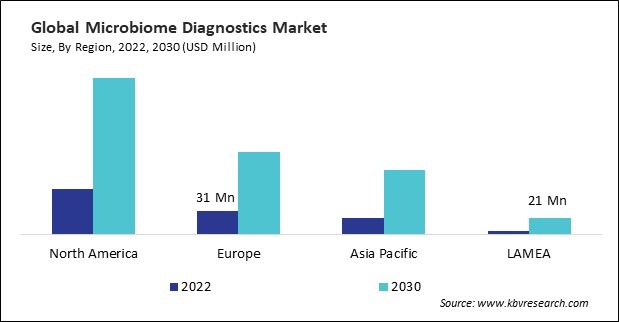According to a new report, published by KBV research, The Global Microbiome Diagnostics Market size is expected to reach $416.1 million by 2030, rising at a market growth of 17.5% CAGR during the forecast period.
The Research Application segment is exhibiting a CAGR of 14.2% during (2023 - 2030). The research application segment encompasses various research areas and experimental approaches, including basic research, translational research, clinical trials, epidemiological studies, and drug discovery. Microbiome diagnostics are utilized in diverse research applications, such as studying microbial ecology, deciphering host-microbiome interactions, identifying disease biomarkers, evaluating treatment efficacy, and developing microbiome-based therapeutics.

The Reagents & Kits segment is generating the highest revenue in the Global Microbiome Diagnostics Market by Product in 2022; thereby, achieving a market value of $253.2 million by 2030. Reagents and kits are essential for conducting microbiome analysis, including sample preparation, DNA extraction, library preparation, and sequencing. These reagents and kits provide the tools and protocols for isolating microbial DNA, amplifying target sequences, and preparing sequencing libraries, enabling researchers and clinicians to perform comprehensive microbiome analysis efficiently and accurately.
The Saliva segment is registering a CAGR of 18.1% during (2023 - 2030). Saliva sampling is non-invasive and easily accessible, making it convenient for researchers and patients. Unlike other sample types requiring invasive procedures or specialized collection techniques, saliva samples can be obtained through simple and painless methods such as saliva collection devices or swabs. This non-invasive sampling approach reduces patient discomfort, increases compliance, and facilitates sample collection, leading to higher sample throughput.
The 16S rRNA Sequencing segment is leading the Global Microbiome Diagnostics Market by Technology in 2022; thereby, achieving a market value of $246.9 million by 2030. 16S rRNA sequencing enables targeted analysis of microbial communities by amplifying and sequencing the hypervariable regions of the bacterial 16S ribosomal RNA gene. This approach allows researchers to focus specifically on bacterial taxa in complex microbial communities, such as the human gut, oral cavity, skin, and environmental samples. By targeting the 16S rRNA gene, researchers can identify and characterize bacterial taxa, assess microbial diversity, and elucidate community composition and structure in a cost-effective and high-throughput manner.
The Academic & Research Institutes segment is experiencing a CAGR of 17.7% during (2023 - 2030). Academic and research institutes are at the forefront of microbiome research, driving innovation and discovery in understanding the role of the microbiome in health and disease. With increasing recognition of the microbiome’s importance in various physiological processes, academic and research institutions are expanding their microbiome-focused research programs to investigate microbial communities’ composition, function, and interactions with the host.
Full Report: https://www.kbvresearch.com/microbiome-diagnostics-market/
The North America region dominated the Global Microbiome Diagnostics Market by Region in 2022, and would continue to be a dominant market till 2030; thereby, achieving a market value of $203.8 million by 2030. The Europe region is anticipating a CAGR of 17% during (2023 - 2030). Additionally, The Asia Pacific region would exhibit a CAGR of 18.7% during (2023 - 2030).
By Application
By Product
By Sample
By Technology
By End User
 Unique Offerings
Unique Offerings